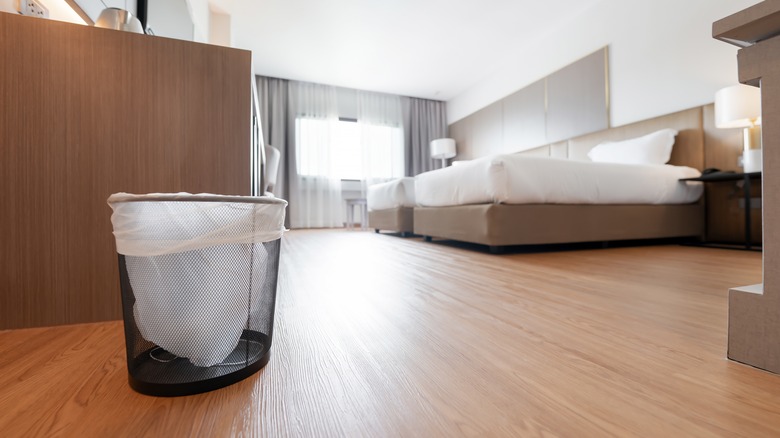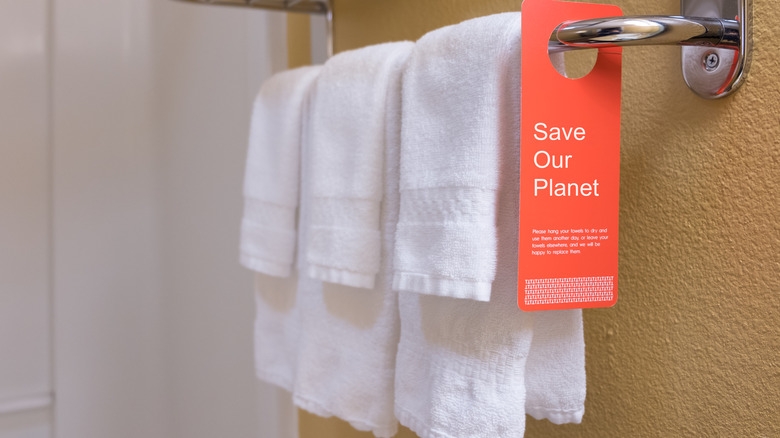5 Of The Easiest Ways To Make Your Hotel Stay More Sustainable
It's no surprise that extensive travel can be harmful to the environment. Long car rides release toxic greenhouse gasses into the air, and flying is even worse when it comes to carbon emissions. You likely already knew that long-distance travel wasn't so great for the planet, but did you know that your hotel stays might also contribute to climate change?
According to UN Tourism, travel accommodations are responsible for 2% of the total carbon dioxide released into the environment. While this might not sound like much, it can have a major impact on global warming over time. Moreover, some estimates suggest that each guest creates about two pounds (roughly one kilogram) of waste every day they spend in a hotel — and that doesn't even include the trash produced when out sightseeing or dining in restaurants.
While it's smart to rethink a long-haul flight or hours spent driving in a car, one of the easiest ways to minimize your carbon footprint when traveling is to make changes to your hotel stays. The hotels you choose and the choices you make after check-in can have a lasting impact on the planet. Here are five simple tips to make your trip more sustainable.
Reduce waste in your hotel room
Many hotels don't offer separate recycling bins in each room, meaning all your plastic bottles, wrappers, and cardboard packaging will likely end up in a landfill. One of the quickest ways to commit to sustainable tourism is to think twice before tossing waste in the trash bin. For instance, resist the temptation to sample all the complimentary toiletries in the bathroom, which typically come in wasteful plastic bags and bottles. Instead, pack your own shampoo and conditioner in reusable containers.
Additionally, look out for single-use packaging and plastics at mealtime. Bringing takeout back to your hotel room can be relaxing after a long day of exploring a new city, but to-go meals come with plastic containers, throwaway utensils, paper napkins, and other items that are just headed for the bin. Consider dining at a local eatery or even stopping by the hotel's on-site restaurant to cut back on waste. Similarly, grab a coffee (in a reusable cup, of course) at a cafe rather than depending on the single-serve pod machine in your hotel room.
Cut back on water and electricity use
When you're at home, you probably keep an eye on how much water and electricity you use in an effort to save money. In a hotel, however, it can be all too easy to keep the lights on or take extra long showers, knowing you won't have to foot the exorbitant utility bill. But just because you aren't paying for the water and electricity doesn't mean the planet isn't. Electricity contributes to air pollution, while water use creates carbon dioxide and takes vital resources from natural habitats.
Make tweaks, starting in the hotel bathroom. Be efficient with your time spent in the shower, and turn off the water when possible (such as when you're sudsing up your hair). Skip the hot baths in your room and find a communal spa or pool instead. Some public bathing facilities are world-renowned, such as Budapest's famous bathhouses and Japan's onsens.
Elsewhere in your hotel room, be mindful of your electricity consumption. Turn the lights off when not in use, and remove your key card from its slot when you head out to ensure the power is switched off. Also, be conservative when adjusting the temperature in the room, assuming you have your own thermostat. In the summer, avoid blasting the air conditioning, and throw on an extra sweater before turning up the heat in winter.
Reuse towels and other linens
Nothing beats the feeling of fresh sheets on the bed or a clean towel to wrap up in after a shower. At some hotels, it's standard for housekeepers to change the bedding and swap out the towels every day during a guest's stay. However, doing all that laundry isn't sustainable from an environmental standpoint. Just think of all the water, electricity, and (sometimes harmful) detergents used for every single load. Plus, the more frequently an item gets washed, the quicker it'll wear down and need to be replaced, which only exacerbates landfill waste.
The best way to deal with this issue is by using the "do not disturb" sign to stop cleaning staff from entering your room and replacing your towels and bedding. You can also familiarize yourself with your hotel's policies on providing fresh linens. For example, some hotels encourage guests to hang any towels they wish to reuse and toss dirtied ones on the floor to be replaced.
Rethink the hotel breakfast buffet
Anthony Bourdain always avoided hotel breakfast buffets when traveling, but you don't have to be a famous foodie to follow his lead. Besides the quality of the food being hit or miss, skipping the hotel breakfast buffet may also be a smart move for the environment. The Clean Technology Centre reports that buffet breakfasts produce twice as much waste per diner compared to breakfasts served à la carte. On average, there are 10 ounces of waste per customer when a buffet is offered versus only 4.5 ounces during a menu-based meal.
One obvious reason hotel breakfast buffets are so wasteful is that most guests load up their plates with more food than they can consume. Chances are you've done the same before, and an easy fix would be to sample fewer items to avoid leaving leftovers. However, that's not the only thing making these buffets bad for the environment. A lot of waste is also produced to keep the buffet fresh and fully stocked for hours. Hotel staff typically prepare fresh eggs, sausages, and other food items until the end of the breakfast period, so late risers still have plenty to choose from. Unfortunately, this often means laying out more food — much of which is perishable — than guests will actually consume. To do your part, decline a meal at the buffet. At the very least, be mindful when filling your plate.
Book a stay at an eco-friendly hotel or resort
Personal choices and travel habits can make an impact on the environment, but your efforts only go so far if you're staying at an accommodation that relies on unsustainable practices. Booking a room in an environmentally friendly hotel can be a great alternative to hotels without any green initiatives. You can often identify these hotels by certain certifications and designations, such as Global Sustainable Tourism Council certificates and B Corporation certifications.
Even with these awards, it's a good idea to research your hotel before booking your stay to gauge how sustainable it really is, as some certifications and labels hold little merit. Browse the hotel's website for specific environmental goals and action plans. For large chains, look for published reports. Justin Francis, the co-founder and CEO of Responsibletravel.com, told CNN, "A really good hotel will have an environmental report, and that environmental report would also be shared and made public. On that, I can see the energy [and] waste water use, and I'd want to see that it's reducing. If they don't have an environmental report or are not prepared to make it public, that's a red line for me."
For some inspiration, scan our list of the best eco-friendly hotels in the U.S. Not staying stateside? Sustainable hotels can be found in destinations all over the world. Just be sure to do a little homework before hitting the "book now" button.





